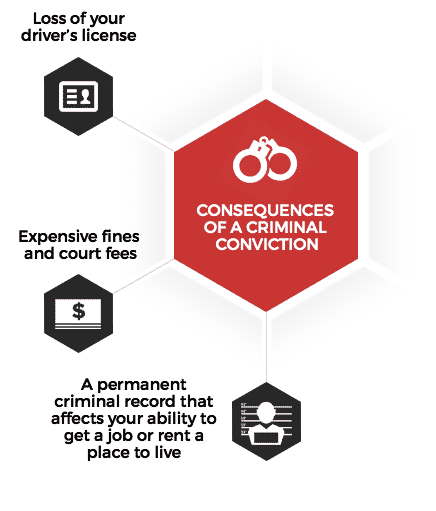
One of the most stressful ways that you might encounter the North Carolina legal system is to be charged with a crime. You find yourself in handcuffs over a mistake or a momentary lapse in judgment — or over something you didn’t do at all.
You may be scared that you’ll go to jail or lose your job and don’t know how you’re going to fight the power that the government wields in a prosecution. It’s important to know that you don’t have to be in this alone. A good North Carolina criminal lawyer who knows the local courts in Johnston, Wake, and Harnett counties can fight to protect your rights and your freedom and make sure your side of the story is heard.

Jonathan understands that the path to a criminal charge often involves circumstances beyond your control — and that sometimes investigators draw the wrong conclusion from evidence and charge people who are innocent of the crimes of which they are accused. He is committed to defending your constitutional rights and fighting to get the best possible result for your North Carolina criminal charge.
To find out how hiring a criminal defense lawyer can help, call (919) 661-4970 for a consultation.
When you’re charged with a crime, a prosecutor must prove beyond a reasonable doubt that you committed the crime in order to convict you. Prosecutions are based on evidence and witness testimony, but any piece of evidence or story told by a witness can be subject to multiple interpretations.
Jonathan Breeden is a tenacious criminal defense attorney who will dig into the evidence and testimony in your case and challenge the interpretations made by police and prosecutors. When there is more than one way to look at a piece of evidence, or if a witness’s account has holes or inconsistencies, then Jonathan will use that to convince prosecutors, a judge, or the jury that reasonable doubt exists.
Additionally, Jonathan knows that police sometimes make mistakes during investigations that can violate your constitutional rights. It may be that evidence was found during an unlawful search, or that police failed to advise you of your rights when you were arrested. Jonathan will scrutinize the investigation process to look for ways your rights may have been violated and argue that evidence obtained through unlawful means should not be used against you in court. When key evidence becomes inadmissible, your charge may be dismissed or reduced.
Whether it’s a simple misdemeanor or a more serious felony offense, a criminal conviction can have serious long-term consequences. Some of the effects of a conviction can include:
However, with the help of a skilled North Carolina criminal lawyer such as Jonathan Breeden, there may be hope that your charge can be dismissed or reduced so that you don’t have to suffer the lifelong effects of a conviction. Depending on the circumstances of your case, you may be able to avoid jail time or other negative consequences.
The criminal process is not as simple or clear-cut as it appears on TV. From being released on bail to negotiating a plea bargain, the criminal court process in North Carolina can be complicated and confusing.
With experience working in Johnston, Wake, and Harnett counties, North Carolina criminal defense lawyer Jonathan Breeden can guide you through every step and pursue the best possible outcome.
When making an arrest, officers are required to adhere to several regulations. First, in order justify an arrest, they must suspect that a crime is being committed. This is known as probable cause. For example, if a driver is pulled over under suspicion of a DUI, the officer might decide to make an arrest when the driver fails certain roadside tests.
Once the arrest is underway, police must also make sure that you understand your Miranda rights. The two most notable are the right to remain silent and the right to an attorney.
In North Carolina, those who have been accused of a crime are typically released after their arrest while they await their day in court. However, the accused must sign a consent form that ensures they will show up for a later court date.
The only exception to this rule is when a serious felony, such as murder, has allegedly been committed. If for whatever reason, a person is not released on bail, a bail amount will be set within 48 hours. In most cases, bail is determined by a judge or a court magistrate.
After being released from police custody or before if you have not made bail or bail is being set by a Judge, the accused is required to attend an informal hearing known as a first appearance. This court appearance starts with the criminal complaint being read aloud.
If the crime in question is a misdemeanor, and you are out on bail then there is no first appearance. Their first appearance is to make sure the accused understands the charges against them and to inquire as to whether they would like a court-appointed attorney.
Countless courtroom dramas portray the criminal court process as an endless and dramatic battle; a flurry of speeches, accusations, and emotional outbursts from each side.
In reality, however, very few cases make it to trial. Most are settled when both parties get together to negotiate a plea bargain. This agreement involves the accused agreeing to plead guilty in exchange for lesser charges or a reduced sentence. Many plea bargains involve a probationary period as a substitute for incarceration.
In some cases, an agreeable plea agreement cannot be arranged. When this happens, both sides are required to make their case in trial. Most trials begin with opening arguments from each side. The prosecution will outline the evidence they are going to present and go on to say that the jury should find the defendant guilty.
The defense, however, uses this time to point out holes in the prosecution’s case. They may also provide reasons as to why their client could not possibly be guilty. From there, both sides take turns presenting evidence and questioning witnesses. This includes cross-examination.
Jonathan Breeden can handle a variety of North Carolina criminal offenses, including:
Being charged with a crime can certainly be frightening and disorienting. Beyond the fear and stress associated with being arrested, you may be worried about the penalties you could face upon conviction.
While all crimes carry different consequences, most can result in huge fines, probation, and even time spent in jail or prison. North Carolina criminal defense lawyer Jonathan Breeden has spent years fighting for the good people of Johnston, Wake, and Harnett counties. With several areas of focus and considerable experience, he can give you the best chance of avoiding these consequences.
When it comes to capable criminal defense attorneys, only a select few have what it takes to achieve the best possible result in your case. When trying to find the right lawyer, there are several criteria that they should meet. A lawyer with the appropriate experience, skills, and legal knowledge should be able to do the following:
The lawyer you choose to represent you in court should also be very familiar with the crime you are being accused of. Legal defenses vary based on crime, and it is impossible to select the right strategy without past experience. When hiring legal representation, it is important to consider the communities that they commonly serve. For example, if your trial is being held in Johnston County, you need a lawyer who understands the procedures and nuances, specific to that area.
If you are being charged with a crime, you must act quickly. Failing to obtain capable legal representation in a timely manner can result in being assigned a public defender for your trial.
These attorneys are often swamped with cases; they may only have a matter of minutes to review your case before it is taken to court. While you should use your time efficiently, it is important to screen the lawyers you meet so that you can be sure of their qualifications.
When conferring with defense attorneys, you should ask questions that include, but are not limited to:
If you have been accused of a crime, you may feel as if you are being treated unfairly. Perhaps you have been falsely accused, and those you have interacted do not believe your side of the story.
You might also be worried about what could happen if you are sent to jail. You might lose your job, and the relationships with your loved ones may be negatively affected.
North Carolina criminal defense attorney Jonathan Breeden has years of experience in helping good people avoid the consequences of criminal convictions. With intimate knowledge of how Johnston, Wake, and Harnett County handle criminal cases, he will create a strategy that aligns with securing the best possible result.